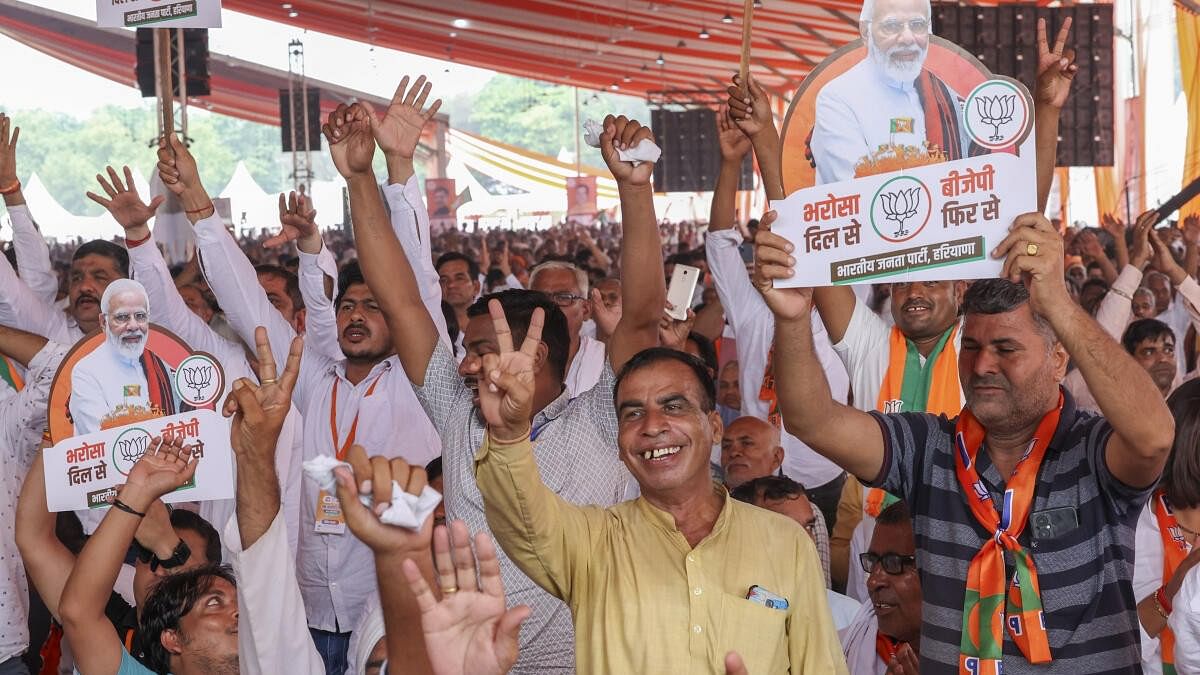
BJP supporters attend Prime Minister Narendra Modi's public meeting in Sonipat, Haryana.
Credit: PTI File Photo
Consolidating one’s vote is one sure-shot way to win an election. In a first-past-the-post system, favorable outcomes can also be achieved by a split in opposition votes. Haryana’s politics in the last decade epitomizes the latter phenomenon in Indian politics.
Jats – the influential land-owning intermediary caste – constitute almost 27 per cent of the state electorate. Even since it was carved out of Punjab in 1966, Haryana’s polity has been neatly divided into Jat versus the non-Jat segment.
Jat stalwarts like Bansi Lal dominated the pre-Emergency Congress. With the emergence of Lok Dal under former Deputy PM Devi Lal, the space got cluttered, so the Congress decided to bet on non-Jat leaders like Bhajan Lal, who belonged to the Bishnoi community.
All these years, the BJP remained a minor player in state politics. It aligns mostly with non-Congress regional parties to mop up seats in urban centers.
In 2004, by nominating Bhupinder Singh Hooda as the chief minister, Congress decided to play the Jat card again. The opposition space, in the process, got appropriated by the Indian National Lok Dal (INLD), led by Devi Lal’s son and former CM Om Prakash Chautala.
The arrangement continued for 10 years. Hooda won a second term with a reduced margin in 2009.
The 2014 assembly polls, held just after Modi’s emphatic victory at the centre, ruptured this status quo.
As both Congress and INLD vied for Jat votes, the BJP stitched a social combination of 73 per cent non-Jat electorate to win 47 of 90 seats with a 33% vote share to install Manohar Lal Khattar as the state’s first BJP CM. The non-BJP votes were evenly split between Congress and INLD who polled 22 per cent and 24 per cent votes respectively.
Five years later, in the run-up to the 2019 assembly elections, Chautala’s grandson Dushyant Chautala launched his outfit, the Jananayak Janata Party. The JJP emerged as another contender for the Jat votes. Chautala’s party weaned away 15 per cent of votes from the INLD to secure 10 seats.
The BJP, which fell just short of a majority with 40 seats, struck a post-poll tie-up with the JJP and ruled for another five years.
After sharing power with the BJP for more than four years, the JJP walked out of the alliance ahead of the 2024 Lok Sabha elections to contest in all 10 seats, hoping to shrug off the anti-incumbency that had accrued on the ‘double engine government’.
But this time around, Congress was able to drive home the point that the smaller parties like the JJP that had remained in government in the face of farmer agitation were merely splitting the anti-BJP vote again.
Alternatively, Congress, which had lent support to the farmer agitation, won over the ‘kisans’, reached out to youth by promising to scrap the Army’s recruitment scheme Agnipath, and played the ‘save Constitution’ card to consolidate the Dalits. In ticket distribution too, the party was careful in giving space to non-Jat communities- especially OBCs, like Ahirs and Gujjars.
BJP countered this and made one last attempt at greater OBC mobilization, by replacing Manohar Lal Khattar with Nayab Singh Saini as CM.
But the Lok Sabha poll results show a massive mobilization of the anti-BJP votes in favor of Congress. The party managed to pick five out of 10 seats with almost 48 per cent vote share after drawing a blank in 2019.
The BJP with 46 per cent votes got the remaining 5.
The biggest setback of the election was that INLD and JJP together could mop up less than 3 per cent of votes.
As parties strategize and realign for the upcoming assembly elections, Chandrashekar Azad Ravan’s Azad Samaj Party (Kanshi Ram) has tied up with JJP and Mayawati’s BSP with INLD. Both alliances are seeking to dunk into the Jat-Dalit space.
Congress alleges the ‘vote-cutters’ are working to split the opposition votes to help the ruling party.
In the Lok Sabha elections, tactically, this strategy failed to bear fruits for the BJP across the country. BSP in UP could not put up a strong show leaving ample space for the Congress-SP alliance to gain an upper hand. In Maharashtra, AIMIM and Prakash Ambedkar’s RPI could not damage the Congress-led alliance. In Assam, Badruddin Ajmal lost his seat by a record margin.
Will Haryana be any different?